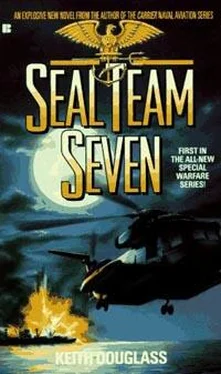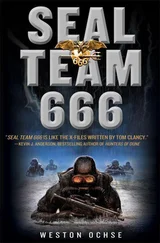Keith Douglass - Seal Team Seven
Здесь есть возможность читать онлайн «Keith Douglass - Seal Team Seven» весь текст электронной книги совершенно бесплатно (целиком полную версию без сокращений). В некоторых случаях можно слушать аудио, скачать через торрент в формате fb2 и присутствует краткое содержание. Жанр: Боевик, на английском языке. Описание произведения, (предисловие) а так же отзывы посетителей доступны на портале библиотеки ЛибКат.
- Название:Seal Team Seven
- Автор:
- Жанр:
- Год:неизвестен
- ISBN:нет данных
- Рейтинг книги:3 / 5. Голосов: 1
-
Избранное:Добавить в избранное
- Отзывы:
-
Ваша оценка:
- 60
- 1
- 2
- 3
- 4
- 5
Seal Team Seven: краткое содержание, описание и аннотация
Предлагаем к чтению аннотацию, описание, краткое содержание или предисловие (зависит от того, что написал сам автор книги «Seal Team Seven»). Если вы не нашли необходимую информацию о книге — напишите в комментариях, мы постараемся отыскать её.
Their cargo includes two tons of weapons-grade plutonium. And now, with enough nuke fuel to arm a superpower, an alliance of fanatics threatens to poison a continent.
In a daring mission of high-seas heroism, Lt. Blake Murdock leads his seven-man unit from Team Seven's Red Squad into bulkhead-to-bulkhead battle — with high-tech
buccaneers who've got nothing left to lose...
Seal Team Seven — читать онлайн бесплатно полную книгу (весь текст) целиком
Ниже представлен текст книги, разбитый по страницам. Система сохранения места последней прочитанной страницы, позволяет с удобством читать онлайн бесплатно книгу «Seal Team Seven», без необходимости каждый раз заново искать на чём Вы остановились. Поставьте закладку, и сможете в любой момент перейти на страницу, на которой закончили чтение.
Интервал:
Закладка:
Murdock turned to make a dignified exit and nearly collided with a familiar figure in civilian clothes who was just coming through the door, a big, olive-green sea-bag balanced on one shoulder.
"Uh... Third Platoon?" the newcomer asked uncertainly, looking around.
"Jaybird!" Murdock said, taking a step back and smiling. "You're just in time!"
Sterling's eyes widened. "Oh, no!"
The SEALs stared after the lieutenant for several long moments after he'd gone.
"What the fuck was that?" Fernandez wanted to know.
"A prick." Garcia replied. "Mickey Mouse himself with delusions of grandeur."
"You guys notice his hand?" Nicholson asked. "He's a ring-knocker."
"No shit?" Garcia said. "An Academy grad?"
"I don't care if he's John Wayne in drag," Fernandez said. "We're SEALS. We don't hafta' take that shit."
"Scuttlebutt is he's from Coronado," Nicholson added. "A fuckin' BUD/S instructor."
"He is," Jaybird put in. "I flew out from California with him last night."
"Aw, man," Garcia said, disgusted. "I did my hard time in BUD/S. What is this shit anyway?"
"Yeah," Fernandez added. "I wonder if that dude's always so full of sweetness and light, man." He pointed at Jaybird. "I thought you California SEALs were 'sposed to be laid back and mellow, man."
"Hey, don't blame me," Jaybird said. "I hardly know the guy."
"Obviously," Nicholson pointed out, "he's an officer an' a gentleman. Far above us enlisted pukes. Say, how'd you get a handle like Jaybird anyway?"
On the deck, Ellsworth gave a mournful groan. "Hey," Garcia said. "Couple a' you guys gimme a hand here."
Together, they got Doc to his rack.
For a long time after that, they discussed the new lieutenant's manner, bearing, attitude, and probable ancestry, comparing it point by point with those of Lieutenant Cotter. So far, the new guy didn't measure up well at all.
Wednesday, 18 May
1145 hours (Zulu +3)
Freighter Yuduki Maru
Indian Ocean, south of Mauritius
The sun glared with brassy heat from the flat swells of the Indian Ocean, as two ships, the Yuduki Maru and her escort, Shikishima, plowed steadily eastward at eighteen knots. Twenty days out of the French military port at Cherbourg, she had another four weeks' voyage ahead of her. Her course lay due east across the Indian Ocean, south of Australia and New Zealand, then turning northwest, passing through Micronesia and the empty waters of the western Pacific until she entered her home port of Tokai, ninety miles northeast of Tokyo.
Yuduki Maru's long-way-around voyage had been dictated by the volatile rumblings of international politics. Like some twentieth-century Flying Dutchman, she was pledged to remain always at least two hundred nautical miles from land. Forbidden outright to enter the waters of South Africa, Indonesia, Chile, or Malaysia she had a sharply limited choice of courses. The Straits of Mulacca, twenty-three miles wide at their narrowest, and the South China Sea, a den of modern-day pirates, both had been closed to her.
In the interests of secrecy, her final course had been set only days before she'd left Cherbourg. Not that secrecy remained absolute. The Greenpeace vessel Beluga had dogged the tiny flotilla since their sailing, remaining just over the horizon, making certain that the Japanese ships did not break their international quarantine.
Captain Chuichi Koga, Yuduki Maru's master, was unconcerned with the Beluga, as he was with the quarantine and with the crowds of protestors who'd mobbed the fences at the naval base perimeter at Cherbourg. The total voyage, Cherbourg to Tokai, should take seven weeks. Koga, a professional, confident, and supremely competent officer of the merchant marine who demanded absolute punctuality of himself and of his crew, had no doubts whatsoever that they would arrive in port on schedule.
Yuduki Maru was small for so long a voyage, with a length overall of 119 meters, a beam of less than eighteen meters, and a full-load draft of just over six meters. She had a displacement of 7,600 tons.
Nevertheless, she was an impressive vessel. Like her sister ship, the Akatsuki Maru, she had been an American cargo ship — sailing under the name Atlantic Crane — before her conversion to her new and highly specialized task. She'd been refined in a Belfast shipyard, her hatches strengthened, her huge, forward deck crane removed, and her electronics suite upgraded and modernized. Large sections of her cargo hold had been sealed off and converted to carry extra reserves of diesel fuel so she could manage her forty-thousand-kilometer voyage without refueling. Some of her cargo space had also been converted into accommodations. Besides her usual crew of forty-five, the Yuduki Maru carried thirty armed guards.
And, of course, there was the comforting presence of the Shikishima a kilometer to port. Captain Koga, like most of his superiors, would have been far happier if a couple of Japanese Navy destroyers could have escorted Yuduki Maru on her long passage. Unfortunately, Japan's postwar constitution specifically prohibited any of her 125-odd military vessels from being deployed outside Japanese waters. For that reason, escort duties had been assumed by the Kaijo Hoancho, an organization analogous to the U.S. Coast Guard. Shikishima had been specially built for this task at a cost of twenty billion yen, a 6,500-ton cutter armed with machine guns and one of the American Phalanx close-in point-defense systems. She also carried a Kawasaki-Bell 212 helicopter on her fantail landing platform.
The Americans had been involved with planning for the security of these voyages from the beginning. They were, naturally enough, keenly interested in the security of Yuduki Maru's precious and deadly cargo.
Two tons of plutonium, after all, was prize enough to attract the eye of dozens of governments, political factions, terrorist groups, environmental activists, and outright criminals all over the world.
It was enough to provoke a war, and more than enough to finish one. It was also a symbol of Japan's national honor.
Japan's interest in plutonium was strictly peaceful and economic. Ever since the 1960s, the country had been committed to achieving energy self-sufficiency through an aggressive and high-tech atomic power program. In particular they'd sought the promise of fast-breeder nuclear reactors.
There were already forty-one conventional nuclear power plants fueled by uranium in the Japanese home islands. For years, the spent nuclear fuel from these reactors had been shipped to reprocessing plants in Europe, notably the French company Cogema, in Cap de la Hague, Normandy, and a British plant in Sellafield, Cumbria. There, high-grade plutonium was extracted from the radioactive ash left over from the conventional nuclear plants; a special type of power plant, the so-called fast breeder, generated power from plutonium and, in a process that seemed to defy the normal laws concerning something from nothing, actually generated more nuclear fuel as an end product. Ultimately, Japan could be completely self-sufficient, generating all of its own power needs, even exporting power to other nations.
It was a worthwhile goal, given that Japan was currently almost entirely dependent on outside sources for energy, and she had some grand and energy-intensive plans for future technological growth. Unfortunately, there were some serious drawbacks as well.
First and foremost, plutonium is without question the deadliest substance known. Quite apart from its high levels of radioactivity, it is so toxic that a microscopic amount can kill a man, while a gram or two in a water reservoir can wipe out an entire city. And, of course, there is the nuclear genie; the hardest part of building an atomic bomb is processing the uranium in the first place, or getting hold of enough plutonium to provide the fissionable material. Just eight kilograms of plutonium is enough for the manufacture of a quick-and-dirty nuclear device as powerful as the one that burned the heart out of Nagasaki.
Читать дальшеИнтервал:
Закладка:
Похожие книги на «Seal Team Seven»
Представляем Вашему вниманию похожие книги на «Seal Team Seven» списком для выбора. Мы отобрали схожую по названию и смыслу литературу в надежде предоставить читателям больше вариантов отыскать новые, интересные, ещё непрочитанные произведения.
Обсуждение, отзывы о книге «Seal Team Seven» и просто собственные мнения читателей. Оставьте ваши комментарии, напишите, что Вы думаете о произведении, его смысле или главных героях. Укажите что конкретно понравилось, а что нет, и почему Вы так считаете.












